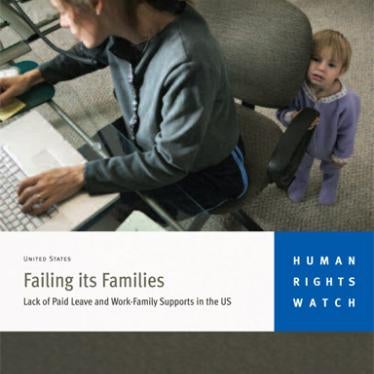You're pregnant? Congratulations!
You must be so excited. But becoming a new parent can be tough, too, and newborns sure need a lot of care. Good thing you'll have a year of partially paid leave from work through your country's parental leave program. Your partner can get paid leave too.
What's that? You're in the United States? Oh. Sorry. Almost everywhere else you'd get paid leave, but not in America.
So you won't be entitled to paid maternity leave under law. But surely your employer will give you a few months of paid family leave?
No? Oh, right. Only 11 percent of civilian employees in the U.S. have paid family leave benefits.
But you must have paid sick days or vacation days to use during maternity leave, right?
Not that either? I see. You're one of about a third of U.S. workers who have no paid sick or vacation leave.
OK, but at least you can be sure that you'll get your job back even if you take three months of unpaid leave under the Family and Medical Leave Act. Sure, you may go into debt during leave, maybe you'll even need to go on food stamps, but, hey, your job is protected.
Wait, you say you work for a company with 40 employees? Ouch. No job protection for you. The Family and Medical Leave Act only helps if there are 50 or more employees.
So what's your plan? Two or three weeks of unpaid leave, and you just hope you won't get fired?
Um, OK. But aren't you worried about getting breast feeding established? Will your office at least let you pump breast milk when you're back at work? Ah, they say you can pump in the toilet stall. I see.
Well, I wish you luck! Like I said, in 178 countries - Canada, Mexico, Australia and all of Europe, for example - the law would have guaranteed you some or all of your pay during maternity leave. In many places, you would have at least three or four months off, and a year or more in others. Paid family leave is even in international human rights treaties! Yeah, the ones the U.S. hasn't ratified.
In the U.S., we like to give the marketplace free rein. So paid time off work for new parents is really just up to the employer in most states, not some government mandate! This works great for some employees, especially high-paid professionals. They're six times more likely to get paid family leave than the lowest-income workers. But I guess you're not one of those high-paid professionals.
Sorry, I didn't mean to get you depressed. Hey, there is some hope. There were bills proposing paid family leave insurance programs in 10 states last year. California and New Jersey already have programs like this, giving workers six weeks of partially paid leave to care for new babies or family members with serious health problems. They're working great, actually, with most employers reporting positive impacts on productivity and turnover. There are even a few bills in Congress that would establish paid family leave, or at least give states funding to set up programs.
OK, we all know how fast legislation moves these days. But public opinion polls show that the vast majority of Americans support the idea of paid leave and other policies to support working families.
But your baby is due in a few months. Let's face it. Congress and state legislatures sure aren't likely to move that fast. It took about a decade to get the Family and Medical Leave Act passed, after all. I hate to say it, but you're on your own.
Really - good luck.







